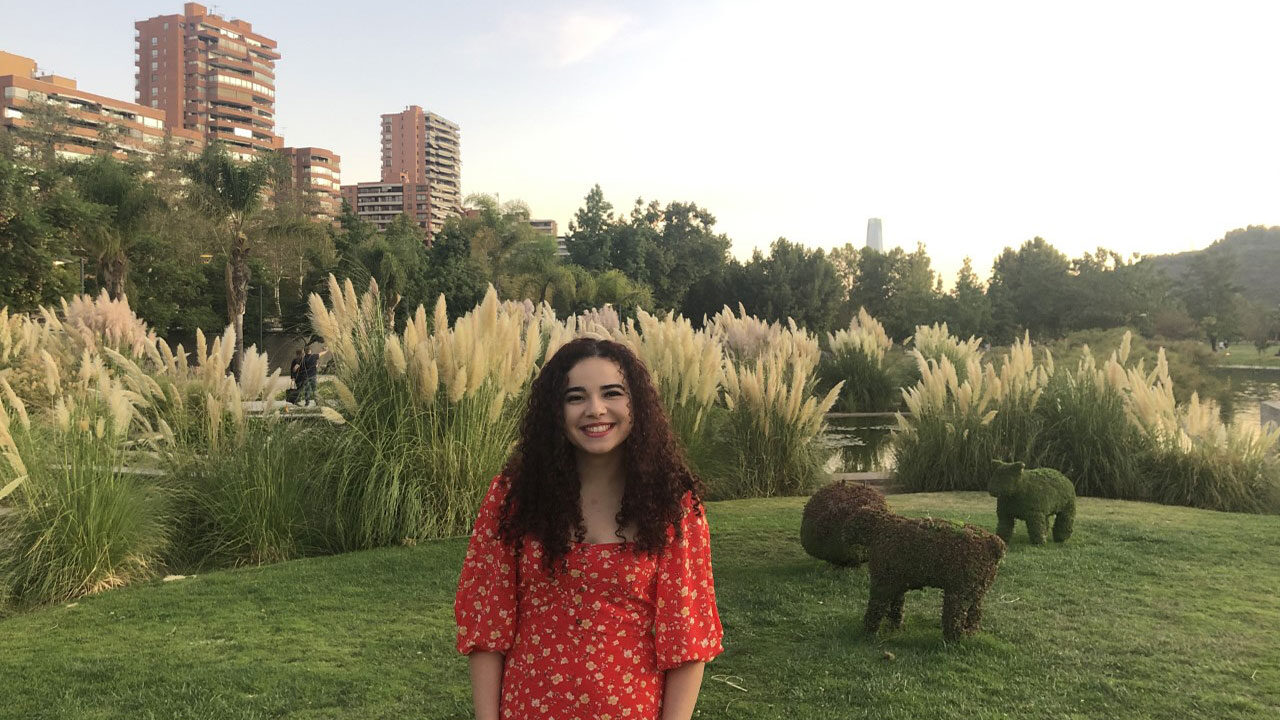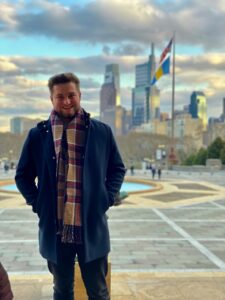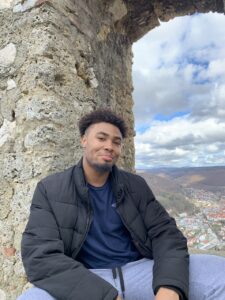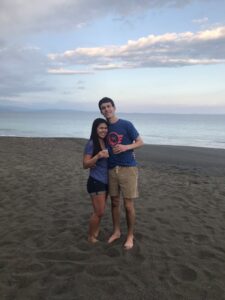
Cozying up at home is bearable when you are middle-aged and contentedly married, your career and social life are well-established, and your daily routine often exhausts you. But what is it like for a graduating senior who was just about to launch their adult life, or an undergrad trying to line up internships and travel abroad? I have little contact with the students at Washington University, but I rounded up a few and grilled them. By their own admission, they are a little driven, used to studying among some of the brightest minds in the country, with goals held up that most folks never attain. Now all that has skidded to a partial halt, and they are sitting in their childhood bedroom fighting the temptations of a nap or a Netflix binge. This pandemic has shaken some of their most basic assumptions about the world—and about themselves.
Jan Mazur

Jan Mazur “eating some flamin’ hot Cheetos” on Myrtle Beach before the news hit. (Image courtesy Jan Mazur)
Sun-baked sand, salty waves … Jan Mazur was in Myrtle Beach with his Ultimate Frisbee team. Because he is premed, a senior majoring in history and psychological and brain sciences, he needed that break, everybody relaxed, cracking jokes, not a book in sight. …
Then came word of the worsening pandemic. The first jolt was the cancellation of all travel: There would be no more tournaments, and he would not be doing his research project in the Bahamas over summer. The second jolt was news of the dorms closing. Mazur, the team captain, called everybody together: “Okay, we have to get out of party mode for a minute and decide what to do.”
Once back in St. Louis, they realized they could no longer hang out. “Also, after a week of partying, everybody feels kind of sick, and we’re thinking, ‘Do we have it?’” Mazur recalls. “And we still wanted to finish strong, but we were struggling to get motivated again, find the fire we all once had,” sitting alone with a laptop.
He had been psyched to give his senior words of wisdom to the team; now, there would be no ceremony. “Maybe we should be more intentional in what we are doing prior to these big moments of closure,” he thought, “be more real with each other all the time.” Ultimate Frisbee was a lot of jokes and fun, but there were so many important things he had wanted to say to his teammates. “And now those people are not around.”
Max Klapow

Max Klapow outside the Philadelphia Museum of Art. (Image courtesy: Max Klapow)
Back home in Birmingham, Alabama, Max Klapow took a walk with his mother—and nobody stepped back from the trail but them. “It was maddening,” he admits.
One year earlier, Klapow, then a sophomore, had given a Wash.U. TED talk about radical empathy. He had grown up gay and Jewish in the South, so he had given a lot of thought to the way people struggle to connect. Now, his mother wanted to know just how one could have radical empathy for these idiots who refused to socially distance.
“It doesn’t mean I’m going to assimilate their beliefs to my own,” he answered. “It’s that you have to come at it from a place of general curiosity and want to understand. A lot of people who do not practice social distancing fall into the category of ‘I’m really scared, and my response to that is to be delusional and just will away what is happening.’ That fear is something I can connect to. I can say, ‘Oh, my God, I’m there too, and it’s really scary.’”
Klapow is a classic Wash. U. overachiever, majoring in philosophy, neuroscience, and psychology with a minor in legal studies and writing, an executive office in his fraternity, a million extracurricular projects, and a training company he cofounded. The last month, his struggle has been to forgive himself. “I slept in today,” he tells me, “and made it to my Zoom class five minutes late, and it took me an hour to make my lunch. That’s all I’ve done so far. At Wash. U., that is associated with some level of failure and shame—you have this opportunity to do a lot, and you haven’t done any of it. The first step for me is to tell myself, ‘That’s okay. I don’t have to be at my best every day.’ We live in a world where the more you can achieve at the youngest age possible defines your success. This whole quarantine thing is the perfect festering ground for people who are used to defining their self-worth by achievement.”
Sofia Miranda-Fred
From Santiago, Sofia Miranda-Fred (pictured above) and her parents were frantically hunting for flights her aunt could take home from Europe before the travel ban—and wondering if there would be a travel ban from South America, too. Once Miranda-Fred was back in her St. Louis apartment, her first instinct was to be alone, figure things out by herself. “I’m the oldest child,” she explains. “I felt like, ‘If anybody needs to know what’s going on, it’s me.’” So she broke that instinctive solitude and became the clearinghouse for accurate information, keeping her parents informed, making sure the family shared a home base.
She knew from the start that she would be taking this seriously, because both her roommates are immunocompromised. She Lysols all the groceries and otherwise stays indoors, except for a few walks, after which she showers and changes her clothes. “I’m a person who likes routine,” she says ruefully, “and this has been anything but grounding! I just keep focusing on what I can control, because I am hyperaware of the things I cannot.”
An economics and strategy major with a secondary focus on political science, Miranda-Fred studied constantly. Spring of her senior year was the semester she was finally going to relax, “do some fun things I hadn’t done earlier because I pushed myself so hard.” Eager to be creative, she had signed up for a class in glass blowing, and she was going to perform in the Latinx, student-run Carnivale. “The idea was that I finally wouldn’t be as consumed by academics,” she says wryly. “This made me realize there isn’t a right semester in your life to start doing things that make you happy.”
Jordan Bow

Jordan Bow on his hastily ended semester abroad, amid the ruins above Bad Urach, Germany. (Image courtesy: Jordan Bow)
In late February, all the talk was of Karneval; nobody in Germany seemed too worried about the novel coronavirus. Jordan Bow, abroad because he is majoring in German and Germanic literature as well as African and African-American studies, took the train to Cologne with another student: “We watched the parade, then roamed the streets,” he says. “There were a lot of pop-up parties, trucks selling great food, great music, great energy. The virus didn’t have a big impact on the celebration itself, just”—his tone changes—“the aftermath.
“We didn’t hear about cases increasing until we went south to Tübingen,” he continues. “That next week, we started theorizing what would happen if America closed its borders. The morning of March 12, I woke up to one of my roommates saying, ‘We’ve got to go home.’ That was the real mayhem: amongst all the sadness, everybody trying to get a plane at the last minute.” Websites were down, and phone waits were six, seven hours—by the time Bow called, it was ten hours.
He went through two airports in Germany and one in Newark—“wearing a mask, but it’s not like I had gloves and a hazmat suit”—before he finally made it home. He went into quarantine with his mother, who could work from home, and a cousin who had been in Miami, while his stepdad and sister camped out elsewhere. The day after he came home, Bow’s throat turned raw; his mother and cousin fell ill soon after. Both Bow and his cousin have asthma, but they would all recover without complications. When his stepdad heard all three were ill, though, he said, “That’s it! I’m dropping the groceries off outside!”
Jacob Finke

Jacob Finke and his girlfriend in Costa Rica. (Image courtesy: Jacob Finke)
The day Jacob Finke arrived for spring break, Costa Rica reported its first case of COVID-19. Six days later, they had twenty-two cases. The week after that, one hundred.
Finke is a senior majoring in international affairs and Chinese language and culture, so he had already begun looking at the novel coronavirus in global context, thinking about its effects on national security and its ability to throw into question, “long-term, the U.S.’s ability to lead with legitimacy and genuine authority.” But when he hurriedly moved home to Louisville, Kentucky, lest he be trapped away from his family, all that theory turned personal.
Cautious 24/7, he is tired of his generation being blamed as heedless—“especially given that all the people in charge who are making bad decisions are definitely not in my demographic.” He would love to think that this pandemic “will make us more compassionate and more grounded in science and more cognizant of public health,” he says, “but there’s also the possibility that it will just make us bitter and angry. Some local leaders, and even a few national actors, have been very clear, very steady, saying, ‘We can get through this. We are strong enough to do this.’ They might leave us with a positive memory rather than the bitter part of it, the fear and anger and sadness.”
What to do with all this time
“Hi, what are you doing over there?” Miranda-Fred’s parents keep calling to ask, not realizing that she still has a class schedule and in fact more work than ever. She is struggling with the blur of work and home: “I’d moved off campus because I needed that separation. Now I almost feel like I’m regressing to freshman year, where I’d do everything in the dorm and have to resist the temptation to take a nap!”
Mazur agrees fervently. He always studied in the library, surrounded by smart people and working hard to feel he belonged among them. Now he studies right next to the television. “My breaks turn into three-hour Netflix binges,” he says ruefully. “And classes are totally different, not being surrounded by people who are taking notes and asking questions.”
Mazur always studied in the library, surrounded by smart people and working hard to feel he belonged among them. Now he studies right next to the television.
Back in normal life, days flew by: ‘You walk to campus, have your class, maybe a meeting afterward, stay on campus to have lunch, do homework,” says Finke. “Here, I open my laptop at 10:59 a.m. and close it at 12:01 p.m. There’s still homework, but I have so much time on my hands! And social life is basically just ZOOM and Facetime. You can’t, like, run into somebody on ZOOM; you have to schedule it, and it creates this weird formality.”
“Virtual stuff is of course very useful,” Bow says. “But when it comes to connections that are usually obtainable physically, it begins to feel as if virtual is not enough. We weren’t exactly created to have virtual relationships. Most of my memories were acquired physically—I don’t remember many text conversations as significant memories. Memories are what we see, touch, feel, smell. Virtual can be a good distraction, but physical can be something lasting.”
Why screens have lost their appeal
“Everyone keeps wondering why people are having such difficulty reaching out to do fun ZOOM calls, when our generation is so conditioned by technology that this really shouldn’t be difficult,” Klapow says. “But as a college student, when you go home, you’re on break. I fall into a different pattern; I don’t reach out so much.” Now he is making a deliberate effort: “Tomorrow night I’m going on a virtual date with a guy he’s been talking to. We’re going to order dinners for each other and have them delivered and then play a game online.”
The loneliness of distancing has hit Mazur hard. “The lack of intimacy—and by that I mean just hanging with your friends. People don’t realize how much college students are fueled by the presence of other people.”
The loneliness of distancing has hit Mazur hard. “The lack of intimacy—and by that I mean just hanging with your friends. People don’t realize how much college students are fueled by the presence of other people.” Once, he might have rolled his eyes at shallow chit-chat; now he realizes “even those half-empty conversations with people I barely know gave me a lot of energy.”
Klapow, the son of two clinical psychologists, has been watching with horror just how swiftly friends can move “from being wonderful to not being able to get out of bed, not eating.” This is why Miranda-Fred makes it a point to Facetime and text people regularly: “This is a time you can really feel alone.”
Moments of irrational (and rational) panic
“You stop your everyday stuff for just one second,” Finke says, “and think about what’s actually happening, and it just blows you away.” A runner, he is used to waiting, and waiting, for a break in the traffic so he can sprint across the road to the park. “The past two weeks, there hasn’t been a car in sight. It’s nice to have the roads to yourself, but it does make it seem like a ghost town, and it brings that feeling of apocalypse, and then I have to remind myself that it’s a good thing, it means people are taking this seriously.”
Bow had a moment of irrational panic, “thinking oh my God, this could wipe out half the American population when the numbers are nowhere near projected to get that far.” For Klapow, it was seeing a “two cartons of eggs per person” sign and wondering about the food supply chain: “How many steps are we, really, from widespread poverty and social systems breaking down and panic when you can’t get milk?” For Mazur, what is surreal is “the silence. We hold our breath when we walk by each other.
“People are just ready to be angry with each other,” Mazur notes a minute later, thinking of the woman who, when he smiled at her at the grocery store, snapped at him to stand back even farther. The anger is fear, of course. “And I personally think fear is the root of most human discontent.” Heart attack rates have dropped dramatically, he adds, not because there are fewer heart attacks, but because people are scared to go to the hospital to seek treatment.
“People are just ready to be angry with each other,” Mazur notes a minute later, thinking of the woman who, when he smiled at her at the grocery store, snapped at him to stand back even farther. The anger is fear, of course.
What scared him was the blog of a medical resident in New York: “So many people were dying alone, behind glass doors. And she was talking about how a very old man came in with his own ventilator, and the whole time all people were thinking was ‘Let him pass and give that ventilator to someone who is younger and has a better chance of surviving.’ For them to be playing God like that”—was terrifying.
Worst of all, the students agree, is the uncertainty. “How long will people have to live in fear?” Bow wonders. Asked how he deals with uncertainty, Finke says, “Not super well. I’m a little bit of an anxious person generally. I sometimes have a propensity to go toward the worst-case scenario, which is not great in a situation like this one.” Mazur is training himself to think like a movie camera, focusing in tight on a biology exam he wants to ace, then zooming out to remind himself he is not the only one feeling overwhelmed. But “there comes a point,” Klapow notes, “when you can’t be resilient with no end date.”
The country, the world, the future
“I hope this time in history is never reduced to just an annoyance,” Miranda-Fred says. “I hope we can look back on it with respect.”
“I don’t think society is going to go back to the way it was before,” Mazur says. “I’m hoping for some dramatic changes to our healthcare system. So many people are suffering. Our hospitals aren’t prepared. And so many people can’t afford health care—and who are they? The workers now considered essential.”
“We love to pride ourselves on being the land of the free, which we are,” Bow remarks, “but when a crisis like this one comes, there’s a little bit too much free rein. If we’d been a little more proactive about having those tests available … America likes to be number one, but there are many different ways to run a country. Right now our way of running a country isn’t working in our favor.”
“I hope this time in history is never reduced to just an annoyance,” Miranda-Fred says. “I hope we can look back on it with respect.”
He has been thinking about the disproportionate number of African-Americans who are contracting COVID-19: “Many African-American families don’t trust the government in general, let alone the healthcare system. They look for proven home remedies or medicinal herbs. My dad’s side of the family have been on my case talking about echinacea and other herbs to help my fever and immune system! So it’s not surprising that there’s often this sense in African-Americans that something doesn’t apply to us, that we can’t get sick”—even as the prevalence shoots higher.
Crises this big have a way of exposing inequities—and forcing us to question our assumptions. “Wow,” Mazur says, his voice dazed. “There are people who really don’t want to fund the healthcare system, even now. I always thought those people, in a big-time crisis, would come through.”
Klapow looks forward to “some very difficult conversations, come the cooldown, about how our leaders responded. A lot of leadership is who you are when the sky is falling.” He is questioning himself with similar rigor, “thinking about how little opportunity we take to reflect about what we want and why. We follow certain paths because we are told they spell happiness or success—but do they? This is a great excuse to cut some of that away; to notice what was demanding our attention and reassess. There are entire generations that never get a chance to do that collectively.”
